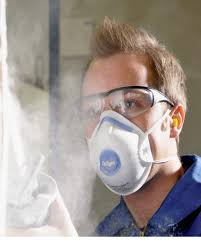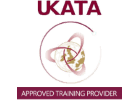What you need to know about Dust Masks (RPE) and Face Fit Testing

We get asked a lot of questions about Respiratory Protective Equipment (RPE - AKA "Dust Masks") and in particular the requirements for Face Fit Testing, so to dispel any myths, and answer the most commonly asked questions, we have put together the following article for your consideration.
Firstly, this article is offering free, common sense advice for trades & industries wanting to protect their workforce against airborne particulates (dusts) and who are seeking to achieve compliance with the relevant statutory provisions. If you are in a high risk sector, such as HSE Licensed Asbestos removal, the Petrochemicals Industry, working with Biological Agents or Chemical Hazards then we would refer you to HSG53 " RPE at Work - A Practical Guide" or the relevant guidance specific to your sector.
If you are in a lower risk industry wanting particulate protection, e.g. construction, refurbishment, manufacture, plumbing, heating, electrical, property maintenance, ceramics, cleaning, joinery, carpentry, groundwork, painting & decorating etc... then read on.
As an employer you have a legal & moral duty to protect your workforce. There is an alarmingly high number of new lung conditions caused by, or made worse by, work activities - over 31,000 to be exact and 12,000 deaths a year in the UK alone!
The first port of call is to reduce & control dust at source but in reality, many people still rely on RPE to control residual risk. There are many common dusts generated through routine tasks that workers should not be exposed to, such as general nuisance dusts, asbestos, glass fibre, wood, grains, spores and respirable crystalline silica (RCS) from plasters, mortar, cement, screed and masonry.
Once a risk assessment has identified the need for RPE you need to select "adequate and suitable" RPE.
Adequate - Does the "mask" protect the user from the hazard in question? For most trades / tasks this will result in the selection of a reusable P3 or disposable FFP3 (filtering face-piece) respirator, where "P" denotes ‘Particulate’. Why would you want to select a lesser protection factor such as FFP1 or FFP2 masks when there is now a negligible difference in cost?
Next it's time to decide if you are going to select disposable or reusable RPE; on average let us assume that a disposable mask will cost around £2.50 versus say £25.00 for a reusable version. This initial outlay is often the deciding factor when selecting a mask. However, if your staff regularly wear RPE then it won't be long before a reusable mask has paid for itself many times over.
When selecting a mask, pay attention to the overall build, quality, and in particular, the thickness & adjustability of the straps, the width of the face seal area, general construction, comfort, availability, adjustable nose clip, a CE mark, the relevant European Standard... a quality mask will in reality be more user friendly and will ultimately offer better protection, despite having the same Assigned Protection Factor than its cheaper equivalent.
We would always recommend involving your workforce during the selection process, and avoid bulk purchase until you have demonstrated that the mask is suitable.
Suitable - So, you've now selected an adequate mask, it's now time to demonstrate if the mask is suitable. i.e. is it suitable for the wearer? This is where Face Fit Testing comes into play. Is face fitting a legal requirement, you may ask? The short answer is, yes. Face fit Testing is currently the only recognised practice that demonstrates if a mask fits the wearer.
Various Face Fit testing methods are detailed in the HSEs OC282/28, however we will focus on Qualitative Face Fit testing, often referred to as "the taste test". This type of test is a relatively crude technique, however, when it is undertaken correctly, it is a very effective method. Face Fit testing must be undertaken by a competent person; one way of demonstrating competence is to select a "Fit 2 Fit" approved face fit tester. The "Fit 2 Fit" scheme is managed by the British Safety Industry Federation (BSIF) and recognised by the HSE.
There is another method of Face Fit testing known as the Quantitative method, however this is typically reserved for higher risk environments or the use of full face respirators.
The next hurdle is the issue of facial hair. In order for a close fitting respirator to create an effective seal to the face, the wearer must be fully clean shaven in the area of the face seal. Any stubble or facial hair present in this area will compromise the seal, leaving the wearer exposed to a variety of airborne hazards. It is for this reason that Face Fit testing should only be undertaken on people who are clean shaven; furthermore the wearer must be clean shaven any time that they wear the mask going forward.
Alarmingly, estimates suggest that 40-60% of dust masks in use do not fit the wearer; a good proportion of these ill fitting face pieces is due to poor fitting, lack of adjustment, and not applying sufficient tension to the straps. A major failing is the positioning of the straps with many wearers positioning both straps on the neck, incorrect! Bottom strap neck, top strap crown thus pulling the face piece equally onto the face, improving the seal around the nose and resisting directional displacment during movement.
If you're wondering when Face Fit tests expire, there really is no answer, and our Face Fit test certificates do not carry an expiry date. The wearer should be re-tested whenever a new type of RPE is issued, or if the facial features change, such as from weight loss or weight gain. Best practice would be to re-test the user every 12-24 months dependant on the substances being handled, as per policies and procedures, or sooner if there is specific guidance in your sector i.e. Asbestos.
Despite the fact that Face Fit testing is essentially a mandatory requirement, lots of main clients are now specifying that all workers wearing RPE should have a Face Fit test, and we have even heard examples where the use of disposable RPE has been banned on certain sites... besides which, I'm sure you all want a safe, fit & healthy workforce, which is hopefully why you are still reading.
We would love to offer further free, impartial and common sense advice. Please feel free to get in touch for further information.
If you enjoy reading our articles, please feel free to share them by clicking the tab(s) below.
Tweet More Articles











